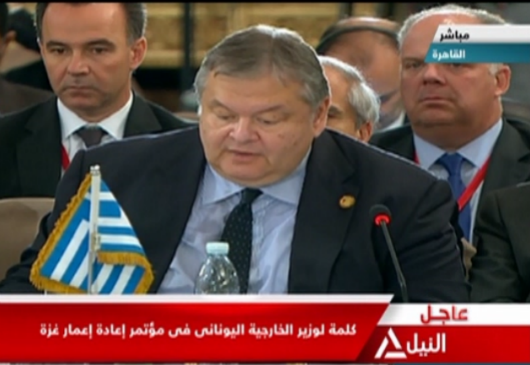 I wish to thank our Egyptian and Norwegian colleagues, Ministers Sameh Shoukry and Borge Brende, respectively, for this very important and timely initiative.
I wish to thank our Egyptian and Norwegian colleagues, Ministers Sameh Shoukry and Borge Brende, respectively, for this very important and timely initiative.
Allow me, first of all, to pay tribute to the Egyptian Authorities for their instrumental role in achieving a ceasefire in Gaza on August 26th and for facilitating talks between Fatah and Hamas, as well as between the Israelis and the Palestinians, on the “day after” in Gaza.
As we, the Foreign Ministers of Greece, Egypt and Cyprus, noted in the joint communiqué we issued following our trilateral meeting last month in New York, on the margins of the UN General Assembly, Egypt is a pillar of geopolitical stability, not only in relation to Gaza, but also in the wider region of the Middle East and North Africa. The Egyptian Government needs to be supported by the international community in its efforts to address key domestic challenges, such as the security situation.
Of particular importance in this regard is the situation in the Sinai Peninsula, not only because of its geographical proximity to Gaza, but also because of the presence of historic and iconic Christian Orthodox institutions, such as the Monastery of St. Catherine: a symbol of peaceful co-existence between Muslims and Christians over the centuries, which needs to be protected from any kind of attack. We trust the Egyptian Government’s determination in this regard, and we fully support its efforts to address the threat posed to security by terrorists, who also commit atrocities. Security in Sinai will have a direct, positive effect on Gaza.
Following the recent devastating conflict - the third in the last five years - Gaza finds itself in desperate and urgent need, not only of reconstruction, but – more broadly – of recovery and relief for its suffering population, and of restoration of normal daily living conditions, including through access to, and from, the outside world.
We encourage Israel and the Palestinian Authority to seize the current opportunity and continue to engage in negotiations, under the auspices of Egypt, regarding a viable future for Gaza.
Only in such a way can the sustainability of the ceasefire be secured in the longer run, thus avoiding another round of conflict.
A key prerequisite, in this perspective, is the ability of the Palestinian National Consensus Government to exercise its responsibilities in Gaza, including as regards the administration of the crossing points.
Greece welcomes the understanding reached here in Cairo, on 25 September, between Fatah and Hamas, which paves the way to that effect.
We also welcome the agreement reached between Israel, the Palestinian Authority and the UN on a trilateral mechanism for the reconstruction of Gaza, through UN monitoring, while providing - at the same time - the necessary security assurances to address legitimate concerns regarding the end use of construction-related materials.
The role of the Security Council remains primordial in this regard, including through the potential for establishing an international monitoring and verification framework for the reconstruction of Gaza.
Greece has always been a staunch supporter of the Palestinian people in their quest for statehood, dignity and national unity.
[For the period 2008 to 2012, and despite our serious budgetary constraints, we allocated bilaterally a total sum of 25.66 million EUROs for the benefit of the Palestinians, for technical co-operation, financial support, education, health infrastructure, the social sector, as well as for humanitarian aid. Since the establishment of the recent ceasefire, we have transferred, through the UN Relief and Works Agency, the amount of 500,000 EUROs (of which 200,000 is for repairing the water supply system, and 300,000 for food provisions). Medicines and first aid material collected by NGOs in Greece have been transferred to Gaza. We also expressed our readiness to receive and treat injured civilians from the Strip, especially children.]
Today we are ready to announce our decision to make a pledge of another 1,000,000 EUROs for the reconstruction of Gaza.
No doubt, no ceasefire will be sustainable without a broader political perspective. Gaza cannot be seen in isolation from the wider Palestinian context, as it forms an integral part of the Palestinian territories, and its future is inextricably linked with the future of the West Bank.
Therefore, it is indispensable that the political perspective be sustained for the establishment of an independent, viable and territorially contiguous State of Palestine, under a central government that maintains effective control across all Palestinian territories.
In light of the ongoing turmoil across the wider region (Syria, Iraq, Libya), it is all the more imperative that a final settlement be reached on the decades-old Palestinian issue; an issue that constitutes an open source of instability that feeds potential extremism. The prospect of re-launching, in the foreseeable future, the direct negotiations between Israel and the Palestinian Authority must be fully safeguarded.
The U.S. has played a very important role in this regard; a role that needs to be continued, despite the setbacks.
Unilateral decisions and actions, by either side, that undermine the two-state solution are highly detrimental and must be avoided or reversed, including with regard to further settlement expansion.
All key stakeholders should realize that an agreed solution in the framework of the Peace Process will ultimately be beneficial for all, despite the compromises that will inevitably have to be made. Israeli concessions in the context of Palestinian statehood, in exchange for Israel’s security and recognition in an unstable neighbourhood, is definitely a course worth following.
October 12, 2014


